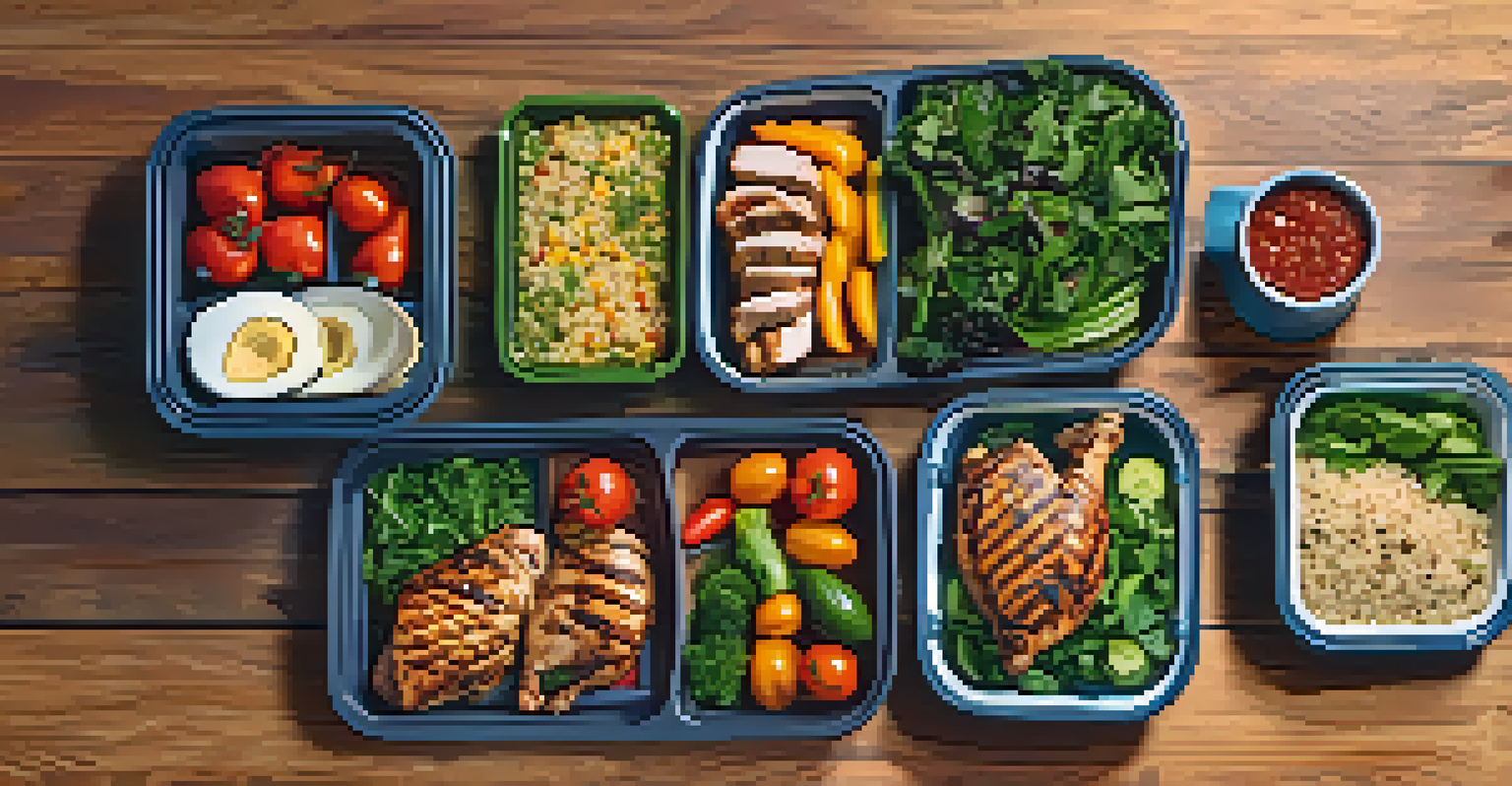Micronutrients: Key Vitamins and Minerals for Bodybuilders

Understanding Micronutrients: What Are They?
Micronutrients are essential vitamins and minerals that our bodies need in small amounts. Unlike macronutrients, which include proteins, fats, and carbohydrates, micronutrients play crucial roles in various bodily functions. They help support everything from metabolism to immune health, making them vital for anyone, especially bodybuilders who put their bodies through rigorous training.
Let food be thy medicine, and medicine be thy food.
Think of micronutrients as the tiny but mighty players in your nutrition game. While you might focus heavily on protein shakes and carb loading, neglecting these little nutrients can slow your progress. Just like a car needs oil to run smoothly, your body requires vitamins and minerals to function optimally, especially when aiming for muscle growth.
Incorporating a variety of fruits, vegetables, nuts, and seeds into your diet can help you meet your micronutrient needs. Each food group brings its unique set of vitamins and minerals, so diversity is key. Remember, the more colorful your plate, the more likely you are to get a range of essential nutrients.
Vitamin D: The Power of the Sunshine Vitamin
Vitamin D is essential for muscle function and bone health, making it crucial for bodybuilders. Often dubbed the 'sunshine vitamin,' it helps your body absorb calcium, which is vital for strong bones. Without adequate vitamin D, your risk of injuries and muscle weakness increases significantly, which can derail your fitness goals.

Many people lack sufficient vitamin D, especially those who train indoors or live in less sunny climates. While sunlight is a great source, you can also find vitamin D in foods like fatty fish, egg yolks, and fortified products. If you're not getting enough from your diet or sun exposure, a supplement might be worth considering.
Micronutrients Boost Performance
Essential vitamins and minerals play a crucial role in supporting muscle growth, recovery, and overall health for bodybuilders.
Incorporating vitamin D into your routine can lead to better performance and recovery. Studies have shown that adequate levels can enhance muscle strength and power, giving you that extra edge in your workouts. So next time you're planning your diet, don’t forget to check if you’re getting enough of this vital nutrient.
Calcium: The Foundation of Strong Bones and Muscles
Calcium is not just about strong bones; it also plays a key role in muscle contractions. When you lift weights, your muscles need calcium to contract and relax efficiently. Insufficient calcium levels can lead to muscle cramps, which can hinder your progress in the gym.
The food you eat can either be the safest and most powerful form of medicine or the slowest form of poison.
Dairy products like milk, yogurt, and cheese are excellent sources of calcium, but if you're lactose intolerant or vegan, there are alternatives. Leafy greens, almonds, and fortified plant-based milks can also provide your calcium fix. It's essential to find sources that work for your dietary preferences.
Regularly consuming enough calcium helps ensure your body can perform optimally during workouts. This nutrient acts like the building blocks for your bones and muscles, so don’t overlook it. Pairing calcium with vitamin D can enhance absorption, creating a dynamic duo for your health.
Magnesium: A Mineral for Muscle Recovery
Magnesium is often overlooked, but it's essential for muscle recovery and energy production. This mineral helps regulate muscle contractions and can prevent cramps during intense workouts. Bodybuilders often benefit from magnesium supplementation, especially after strenuous training sessions.
You can find magnesium in foods such as nuts, seeds, whole grains, and leafy greens. Including these in your diet not only supports muscle function but also contributes to better sleep and reduced fatigue. After all, recovery is just as important as the workout itself, and magnesium plays a significant role in that process.
Vitamin D Enhances Muscle Strength
Adequate vitamin D levels are vital for muscle function and bone health, helping to prevent injuries and improve workout performance.
If you're feeling fatigued or struggling with recovery, it might be time to assess your magnesium intake. A deficiency can lead to reduced performance and increased recovery time, impacting your overall progress. By ensuring you have enough magnesium, you're setting yourself up for success in your bodybuilding journey.
Iron: The Energy Booster for Bodybuilders
Iron is a crucial mineral that helps transport oxygen in your blood, which is vital for energy during workouts. Without adequate iron levels, you may feel fatigued and struggle to maintain your stamina, making it harder to push through those challenging reps. For bodybuilders, this could mean the difference between reaching new personal records and feeling drained.
Red meat, poultry, and fish are excellent sources of heme iron, which is more easily absorbed by the body. If you're vegetarian or vegan, consider incorporating plant-based sources like lentils, beans, and fortified cereals. Pairing these with vitamin C-rich foods can enhance iron absorption, giving you a double benefit.
Monitoring your iron levels is essential, especially if you're feeling unusually tired during workouts. If you suspect a deficiency, a simple blood test can provide clarity. Prioritizing iron can help you maintain energy levels and improve your overall performance in the gym.
Zinc: The Immune System Supporter
Zinc is often touted for its role in immune function, but it also plays a significant role in protein synthesis and muscle repair. When you’re training hard, your body requires more zinc to help recover and build muscle tissue. A deficiency can lead to a weakened immune system, which can sideline you from your fitness routine.
You can find zinc in foods like meat, shellfish, legumes, and seeds. Including these in your meals not only supports your immune health but also aids in muscle recovery. It's particularly important during intense training periods when your body is under stress.
Balanced Diet Fuels Bodybuilding
Achieving a well-rounded intake of micronutrients through diverse foods is key to optimizing performance and recovery in bodybuilding.
For bodybuilders, maintaining optimal zinc levels can help ensure that you stay on track and healthy. If you're feeling run down or experiencing slower recovery times, it might be beneficial to evaluate your zinc intake. A balanced diet rich in this mineral can help keep you performing at your best.
Vitamin B12: The Energy Vitamin
Vitamin B12 is crucial for energy production and red blood cell formation, making it essential for bodybuilders. This vitamin helps convert the food you eat into energy, allowing you to power through workouts with greater endurance. A deficiency in B12 can lead to fatigue and decreased performance, which is the last thing you want when striving for your fitness goals.
Animal products like meat, fish, eggs, and dairy are rich in vitamin B12, so if you consume these, you’re likely getting enough. However, if you follow a vegan diet, you might need to consider fortified foods or supplements to meet your needs. It's vital to stay proactive about your vitamin B12 intake to keep your energy levels up.

Regularly checking in on your B12 levels can help you avoid energy slumps. Incorporating this vitamin into your routine can lead to better performance and quicker recovery, allowing you to maximize your training efforts. Remember, every little bit counts when it comes to reaching your bodybuilding aspirations.
Balancing Micronutrients for Optimal Performance
Achieving the right balance of micronutrients is key for bodybuilders looking to maximize their performance. Each vitamin and mineral plays a unique role, and when combined, they work synergistically to support muscle growth, recovery, and overall health. It’s not just about focusing on one nutrient; it’s about creating a well-rounded diet that meets all your needs.
Meal prepping can be a great way to ensure you’re getting a variety of foods that provide these essential nutrients. By planning your meals, you can easily incorporate diverse sources of vitamins and minerals, making it easier to hit your nutritional goals. Think of it as creating a balanced palette for your health, where each color represents a different nutrient.
Regularly reviewing your diet and considering supplementation can help fill any gaps in your micronutrient intake. Consulting with a nutritionist can also offer personalized advice tailored to your specific training regimen. With a well-rounded approach to nutrition, you’ll be setting yourself up for success in your bodybuilding journey.